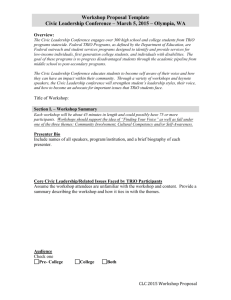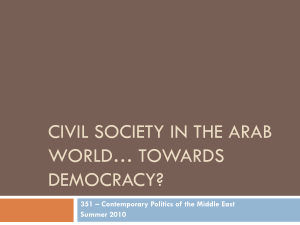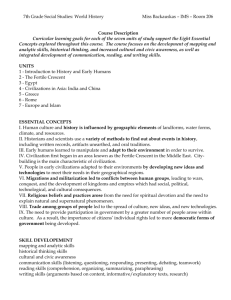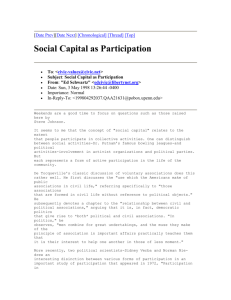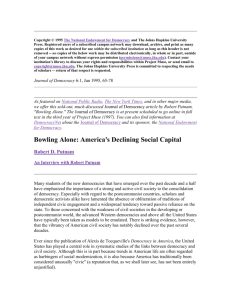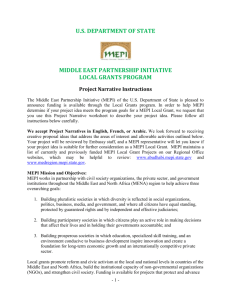The Rise and Rise of Civil Society
advertisement
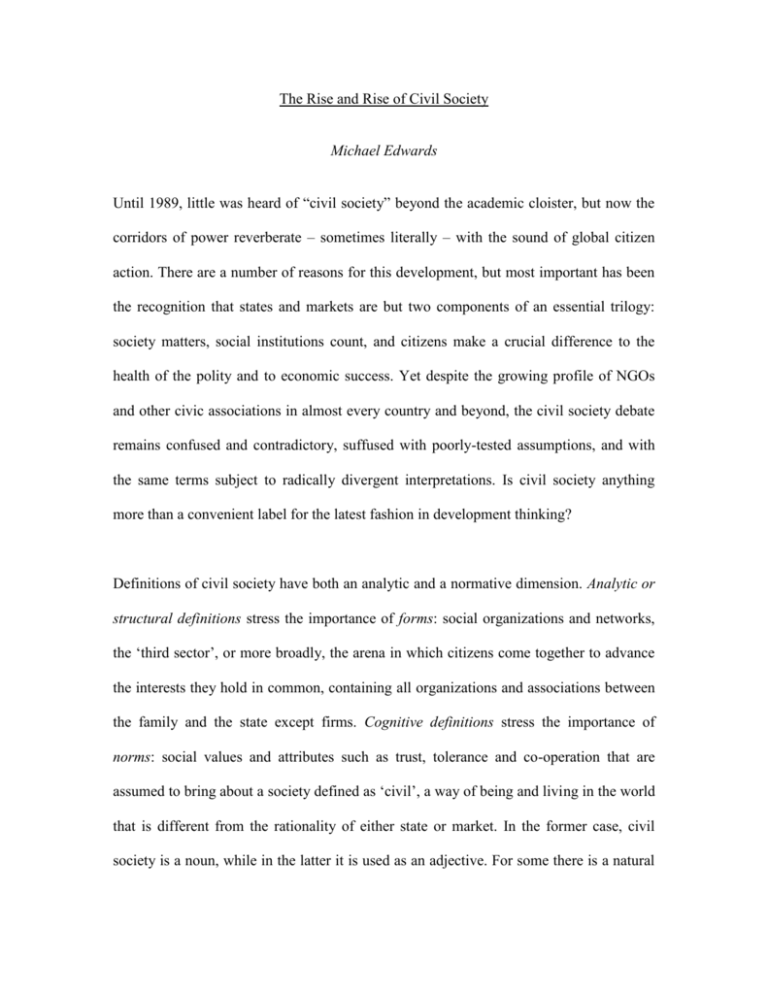
The Rise and Rise of Civil Society Michael Edwards Until 1989, little was heard of “civil society” beyond the academic cloister, but now the corridors of power reverberate – sometimes literally – with the sound of global citizen action. There are a number of reasons for this development, but most important has been the recognition that states and markets are but two components of an essential trilogy: society matters, social institutions count, and citizens make a crucial difference to the health of the polity and to economic success. Yet despite the growing profile of NGOs and other civic associations in almost every country and beyond, the civil society debate remains confused and contradictory, suffused with poorly-tested assumptions, and with the same terms subject to radically divergent interpretations. Is civil society anything more than a convenient label for the latest fashion in development thinking? Definitions of civil society have both an analytic and a normative dimension. Analytic or structural definitions stress the importance of forms: social organizations and networks, the ‘third sector’, or more broadly, the arena in which citizens come together to advance the interests they hold in common, containing all organizations and associations between the family and the state except firms. Cognitive definitions stress the importance of norms: social values and attributes such as trust, tolerance and co-operation that are assumed to bring about a society defined as ‘civil’, a way of being and living in the world that is different from the rationality of either state or market. In the former case, civil society is a noun, while in the latter it is used as an adjective. For some there is a natural connection between these two definitions (since civil society organizations promote civic values), while for others there is no connection at all, since there are ‘uncivil’ associations and ‘civic values’ in the public and private sectors too. The most interesting question is not whether one of these definitions is ‘correct’, but how ‘forms and norms’ are related to each other in different contexts. How does a strong civil society lead to a society that is strong and civil? Those who have tried to answer this question have focused on three sets of functions. The economic role of civil society centers on securing livelihoods and providing services where states and markets are weak, and nurturing “social capital” for use in economic settings. In their social role, civil societies can be a reservoir of co-operative values, caring, cultural life and intellectual innovation. Neo-Nazi groups in Germany or African associations bent on female genital mutilation show that civil societies harbour other attitudes too, but they rarely dominate. In general, it is civic groups that teach people the skills of citizenship and provide a framework for the expression of what they hold in their hearts. Although these economic and social roles are crucial for development, it is civil societies’ role in “good governance” that excites the donor imagination most of all. Especially where formal citizenship rights are not well-entrenched, it is civic groups that provide the channels through which poor people can make their voices heard in government decisionmaking, thus helping to promote transparency and accountability, curb corruption, and build a social consensus in favor of economic reform. Although some evidence exists to support these conclusions, it is often much weaker than is claimed. The underlying problem is that civil society is a ‘mediating variable’ - a byproduct of politics, state building, patterns of inequality and social structure that is shaped by history and context, and which in turn influences macro-social and economic outcomes. So eradicating poverty is not the result of ‘a strong civil society’ but of a much more complex set of interactions that determine whether associational life helps or hinders the achievement of particular goals. Rather than singling out civil society as a hero or villain, we need to ask two more fundamental questions: what combinations of public, private and civic institutions are most effective in securing progress towards development goals in particular contexts? And what conditions shape civil society in ways that enable citizens groups to make the most effective contribution possible to this broader institutional landscape? The answers to these questions would probably include an inclusive civil society that practices non-discrimination; a sound and independent material base; a combination of ‘bonding’ and ‘bridging’ associations (i.e. strong connections both within and across groups); an open, participatory democracy; and a state capable of guaranteeing universal rights. As is well known from the record of foreign aid, these are difficult outcomes to secure Russia and the Balkans are not exactly an advert for our ham-fisted attempts to re-create a civic culture, especially in societies undergoing huge political and economic stress. The dangers here are very real - ‘picking winners’ by pre-selecting the organisations that donors think are most important (usually urban-based advocacy NGOs and networks of the civic elite); spreading mistrust and rivalry as agencies compete for foreign aid; and creating a backlash effect when civic groups are identified with foreign interests. Donors should focus instead on the enabling environment for civic action (strengthening the legal, regulatory and fiscal framework for civic groups and public-private partnerships), and on encouraging the ‘paths and meeting grounds’ that people need to make connections with government and with business. Amid the controversies that surround the civil society debate, it is easy to forget the straightforward lessons that history has to teach about the associational life of different cultures. Ever since the days of Pharaohs, people have associated with one another to resolve the problems of collective action, and to defend and advance the interests they hold in common. Over the last 150 years, political and economic progress in some parts of the world and rising poverty and inequality in others have encouraged civic associations to flourish and to take on ever-greater influence, and this is surely something to be celebrated despite the gaps, conflicts and contradictions that make civil societies such an imperfect instrument for social change. The act of association has power because it releases social energy, meaning the willingness to act from one’s ideals, moral convictions, a desire to serve the community, or a commitment to the common interest. This is the energy that powers civil society across the globe in its encounter with states and markets, and in that encounter, humanity can find renewed hope in fashioning, not just a strong civil society, but a society that is just and civil in all that it does. Michael Edwards is Director of Governance and Civil Society at the Ford Foundation in New York, and author of Future Positive (Earthscan) = 1067 words



